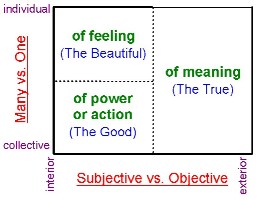Objection:
"Society doesn't have problems. People have problems and people solve problems one person at a time, whether you believe that or not. Give me an example where any individual problem is solved by the mass? This mass-solution psychosis that people such as yourself have is the fundamental problem itself."
Response:

Whoa! You can see from the language that we're dealing with a very deeply-held belief. It so profound that it goes to directly to the root of much of humanity's strife over the ages. It's one of the fundamental sources of conflict.
As for an example, it goes to the heart of systems thinking: "Seeking to understand behavior by examining the whole, instead of by analyzing the parts.
For examples of situations where individual actions don't work, see the page on the "Fallacy of the Commons" and the document on The Archetypes, Generic Structures & Examples.
The dynamics of both the "tragedy of the commons" and "escalation" structures can only be addressed by cooperation (what he calls "the mass"). Individually logical actions actually provoke the problems and make them worse.
The basic question is: "Are we individuals or are we a collective?" The answer is, "We are both."
The different points of view are addressed in Ken Wilber's book, A Brief History of Everything (1996). The first figure shows his dimensions of reality and its four quadrants. Examples:
- Top right: How a persons brain works.
- Top left: What a person thinks and feels.
- Bottom right: How a society works.
- Bottom left: The experience of a societys culture.
 We can study a persons brain for a long time and we still wont know whats being thought and felt. We dont truly understand another society until weve experienced its culture.
We can study a persons brain for a long time and we still wont know whats being thought and felt. We dont truly understand another society until weve experienced its culture.
Both what individuals think and feel and cultural norms of behavior influence what individuals do. Therefore, they are valid aspects of reality.
The second figure illustrates Wilbers observation that our Western culture is polarized; we tend to focus primarily on the Right Side. We tend to emphasize the exterior, science, what can be measured. In doing so, we do not give appropriate consideration to much of whats real: esthetics and ethics. Altogether these different aspects of reality represent the Greeks Three Spheres: The Good, the True, and the Beautiful. For more on this see What's Spirit Got to Do with It?
Conflict can occur when different people approach the same situation from a different place in reality.

The last figure shows that, when we are oriented in different aspects of reality, we speak different languages: of feeling, of meaning and of power.
For example, when one person is talking about how he or she feels, it doesnt help when the other person gives advice about what should be done or what the situation means. When people approach a situation from such very different points of view, and dont recognize they are doing so, neither feels heard
they really cannot communicate.
Consider Wilbers vertical axis from collective to individual. Our culture is based on radical individualism; we tend to see ourselves primarily as individuals, rather than as members of a community.
The truth is that we are neither purely individuals nor purely a collective. We are both. Balance is a difficult discipline; it requires the systems thinking skill of seeing situations with "both/and" thinking, instead of "either/or" thinking.
Systems principles indicate, however, that we must give real weight to the collective aspect of reality because systems have emergent properties
properties that are not associated with any of the parts.
An example of an emergent property is wetness. Neither hydrogen nor oxygen has this property, but in combination as H2O, water is wet. We can consider consciousness itself to be an emergent property
examining individual neurons doesnt reveal consciousness.
The culture of a society is real
culture has real impacts on our behavior in the world. Many corporate mergers have failed because the cultures could not be successfully integrated. Organizations and groups must give balanced weight to individual and collective concerns, because optimizing the parts virtually guarantees that the whole will not be optimized.
Polarity of views along the vertical axis of Wilbers two dimensions has been the source of tremendous conflict throughout human history. The struggle between those who see it has to be one or the other has created bitter wars between the extremes of communism and laissez-faire (libertarian) capitalism.
See A Gardening Analogy that addresses the libertarian concern that consideration of the "collective" is about enabling "command & control".

